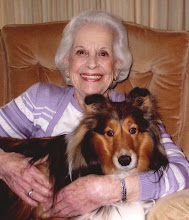Don’t Tell Me . . . Show me
This all started when my children were very young and I would scold them for some inappropriate behavior. Often they would look up at me with pleading eyes, and say, “I love you, Mommy.” And sometimes I would say, “Don’t tell me . . . Show me.” Their saying I love you was meant to settle everything, to make it all right, to have the problem go away. But I never explained to them what I meant by “show me” . . . why not throwing cereal at your sister or not teasing your brother until you made him angry also meant “I love you, Mommy.” It meant that they were making Mommy’s life easier, that we could enjoy each other more, and that early in the morning was a bad time to test my patience.
After having understood the show-me concept with my children, it has taken me 86 years to conclude that this is why elderly people often decline so rapidly. It is because relationships decline. It is when they decline that the more frail elderly begin to feel the lack of love. They may hear, “I love you.” But that is not enough to answer their needs. It is to do “I love you” that brings about their emotional, and thereby their physical, well being.
I suppose it is harder to give to people whose bodies begin to deteriorate and who are unable to remove themselves from whatever their physical limitations might be . . . someone who cannot walk with you or play with you or give of themselves as they once did. But sharing a drive or a long conversation or a movie or a shopping trip or a lunch helps warm the heart and soul. It brings about a sense of continued belonging. I can now understand why my grandmother faded so rapidly. At the end of her life she lived alone . . . a totally new experience for her. And although her need for love may not have been strong, she was denied the sense of companionship and belonging that had always been such an integral part of her life
What is most uncomfortable for a formerly independent individual is to express their neediness . . .to graciously accept token attention from those they care about most . . .to have their pride wounded by others attending to them because of a sense of responsibility rather than truly wanting to share their time and thoughts. It is also uncomfortable when family members dwell on the physical limitations rather than recognize that a still vital being remains. You know they love you, of course. But verbal love or a love based on a sense of duty is shallow compared to love expressed in action.
As a terminally ill patient, I know whereof I speak. I also know that I am incredibly fortunate to have love expressed so beautifully by my loved ones. I receive bountiful caring in word and deeds. It comes in the form of frequent telephone calls, visits from family and friends, occasional lunches, many e-mails, recognizing and satisfying what-ever my needs may be. Often I am blessed with hearing them say, “I love you.” Hearing those words is wonderful because my loved ones also “show me.” I am so grateful for their expressions of love.

No comments:
Post a Comment